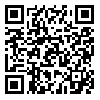BibTeX | RIS | EndNote | Medlars | ProCite | Reference Manager | RefWorks
Send citation to:
URL: http://jdisabilstud.org/article-1-3154-en.html
2- Assistant Professor, Counseling Department, University of Science and Art, Yazd, Iran
3- Assistant Professor, Department of Psychology, University of Science and Art, Yazd, Iran
Abstract
Background & Objectives: Autism is a neuro–developmental disorder that faces a lot of challenges and tension in three areas of communication, repetitive and stereotyped behaviors, and social interaction of the individual and their family. Especially, it has significant effects on mothers, who may face changes in their children's sleep patterns, nutrition, social interactions, and learning abilities. In this situation, the cognitive flexibility of mothers enables them to manage daily changes and challenges more effectively and to find suitable solutions to support their children and help them address their special needs. On the other hand, the negative effects of an autistic child are mostly on mothers, and they face limitations in value orientation or valuable life, and report fewer valuable activities. Considering the vital role mothers play in their children's development, it is essential to provide effective solutions for managing their emotions and promoting cognitive flexibility. One solution is to teach emotional regulation techniques. Therefore, the present study aimed to investigate the effectiveness of emotion regulation training on cognitive flexibility and the value of life of mothers with autism.
Methods: This quasi–experimental study employed a pretest–posttest design with an experimental and a control group. The statistical population of the research consisted of mothers who referred to autism centers in Shiraz City, Iran, in 2022 (n = 160). Sixty invitation letters were sent to mothers with autistic children according to the conditions. Thirty of these mothers, who were eligible and willing to participate in the research, were included in the study through convenience sampling and randomly assigned to two experimental and control groups (15 participants in each group). The inclusion criteria for the study subjects were as follows: a structured clinical interview, informed consent to participate, aged between 25 and 45 years, female gender, secondary education to bachelor's degree, and no known medical disorders. The exclusion criteria were the absence of more than three sessions during the course and the presence of severe physical illnesses. After the groups were formed, a pretest was administered to both groups. A comprehensive emotion training protocol was developed by presenting the intervention program's content to experts in the field of psychology and emotion regulation. They were asked for their opinions and feedback on the content, methods, and strategies of the intervention. In this manner, the validity and reliability of the program's content were assessed. Subsequently, the experimental group underwent eight 90–minute sessions of the Gross Emotion Training protocol, conducted once a week.
Then, a posttest was administered to both groups. The data were analyzed using SPSS 26 software and the multivariate analysis of covariance test (α < 0.05). To collect data, the Valuable Life Questionnaire (Wilson et al., 2010) and the Cognitive Flexibility Inventory (Dennis & Vander Wal, 2010) were used. The training protocol for emotion regulation techniques included 8 sessions with a thematic focus on providing emotional strategies training and cognitive evaluations. Data analysis was performed using multivariate and univariate analysis of covariance in SPSS software version 26. The significance level for statistical tests was set at 0.05.
Results: The results showed that, after controlling for the pretest effect, training in emotion regulation techniques had a significant effect on cognitive flexibility and the value of life of mothers of children with autism spectrum disorder (p < 0.001). Additionally, according to the eta square, 67% of the differences in the posttest scores of the cognitive flexibility variable and 46% of the differences in the posttest scores of the value of life variable for mothers of children with autism spectrum disorder were attributed to the effect of the experimental intervention.
Conclusion: According to the findings, emotion regulation training is a suitable approach to enhancing the cognitive flexibility and quality of life for mothers of autistic children, and this training can be utilized to improve the cognitive flexibility and quality of life for these mothers.
| Rights and permissions | |
 |
This work is licensed under a Creative Commons Attribution-NonCommercial 4.0 International License. |



